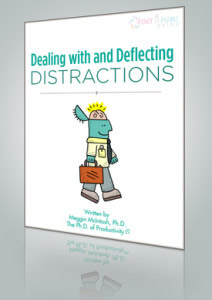Getting Off the Phone by Meggin McIntosh, PhD
 The phone is a wonderful invention, and it’s supposed to be a tool – and for most coaches, it is a powerful tool that allows us to work with clients down the street or on another continent. However, even given that, too much time spent on the phone can easily divert you from other tasks at hand. This is true at work and at home (and especially when you work from home!)If you find this to be true for you, implement one or more of the following:
The phone is a wonderful invention, and it’s supposed to be a tool – and for most coaches, it is a powerful tool that allows us to work with clients down the street or on another continent. However, even given that, too much time spent on the phone can easily divert you from other tasks at hand. This is true at work and at home (and especially when you work from home!)If you find this to be true for you, implement one or more of the following:
- Keep a phone log for one day. Write down the exact start and stop time for each and every phone call you make – including personal calls. What do you notice?
- If you spent more than ten minutes during the day on personal calls, learn this phrase: “I’m sorry, but I can no longer take personal calls at work (or during my work hours).” You don’t have to explain yourself beyond this statement.
- Get a good headset so you can walk around while you’re on the phone. You should NOT attempt to multi-task while you’re on a key call, but you could put stamps on the mail and get a new box of tissues out of the supply cabinet, if you’re answering questions on a survey robocall. Plus, a good headset saves your neck! My favorite company is www.Headsets.com. Great headsets and FABULOUS customer service.
- If your conversation should really involve more people, say “We can’t really make any progress until John/Sue/Marge is on board. I’ll send out a quick email that copies all of us.” Then close out the conversation.
- When you are in the middle of a big task, either have an assistant pick up your calls or (gasp!) unplug your phone. You’ll be distracted by the ringer or the answering machine if you leave it on.
- Check your cell phone for messages at designated times of the day – preferably only once or twice. So many people stare at their cell phones as if they’re searching for the Holy Grail.
- When the caller asks if you have a minute, say “No” or “Not right now” (depending on which is true). Then don’t say anything else. The caller will fill in the “dead” sound with an apology and will quickly hang up.
- If the caller has been efficient and helpful, say so. “I appreciate your brief call rather than having to track down this information myself. Have a great day!”
- Instruct your family/children that you are not to be called during work hours unless it’s an emergency. If they do (and it’s not an emergency), charge them your appropriate rate of pay. It only takes once.
- When the call should conclude, but you find it going on and on, stand up. Somehow people can read the “vibe” you send that says this conversation is over.
Putting one or two of these into practice is likely to give you back AT LEAST 20 – 30 minutes each day. It’s possible to recapture up to 90 or 120 minutes per day by implementing all of these strategies. If you have colleagues, subordinates, bosses, friends, and/or family who need this information, please send this along to them. Or print and post it (now that we have such attractive weekly emails instead of the plain text ones of the past)!
 If you liked these writing tips, you may be interested in the Get a Plan! Guide® for Dealing with and Deflecting Distractions. It’s specially designed so you can accomplish your goals more smoothly (i.e., peacefully, productively, and predictably). You’ll learn ways to take stock of your distractions, along with 6 means to eliminate – or at the very least, minimize – those distractions. I promise that you will have a plan that you can implement starting today.
If you liked these writing tips, you may be interested in the Get a Plan! Guide® for Dealing with and Deflecting Distractions. It’s specially designed so you can accomplish your goals more smoothly (i.e., peacefully, productively, and predictably). You’ll learn ways to take stock of your distractions, along with 6 means to eliminate – or at the very least, minimize – those distractions. I promise that you will have a plan that you can implement starting today.


